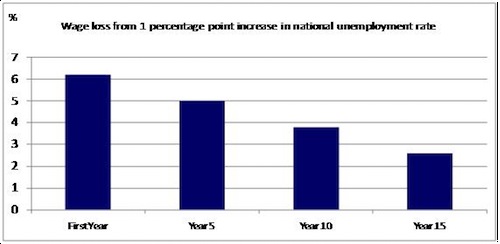Existing data suggests that, for college students graduating during an economic recession, wage depression will follow them throughout their life. The figure below shows that, for every one percentage point increase in the national unemployment rate, a college grad’s wages will drop by about six percent. Five years later, their wages will still lag by five percent. Fifteen years later they’ve recovered their losses to about three percent, but they’re still behind where they would have been. And remember, this data is for each percentage point increase in the unemployment rate.

Data borrowed from the Office of Management and Budget, via Matthew Yglesias.
For more happy graduation news, see here.
Lisa Wade, PhD is an Associate Professor at Tulane University. She is the author of American Hookup, a book about college sexual culture; a textbook about gender; and a forthcoming introductory text: Terrible Magnificent Sociology. You can follow her on Twitter and Instagram.
Comments 7
Sabriel — May 12, 2010
Well. That's depressing.
alicia — May 14, 2010
Stop it! I just want to enjoy my graduation next Saturday...
Shego — May 14, 2010
Um. This is assuming current economic conditions will continue for fifteen years.
Anonymous — May 14, 2010
So, my kids shouldn't go to college at all, and I should... go pick out a nice cardboard box for a retirement home?
Thanks for the uplifting post.
Thoughts of a Post-Graduate Liberal Arts Major « What We Hunger For — February 26, 2011
[...] Six months ago, I sent off my intent to attend letter to graduate school, followed by a letter of decline a month later. I moved to the largest place I have ever live to be with the man I love. I have researched taxes and doctors offices for the first time. My parents now say “I worry about you” more than “I’m proud of you.” I have entered into (and am lost in) an economy which will decrease my lifetime income. [...]
Articles | BB&B — November 14, 2011
[...] how wage earning for recent/current college grads will continue to be depressed for –what the data is suggesting–a lifetime. The article is rather ‘depressing’ and the author know it too, but [...]